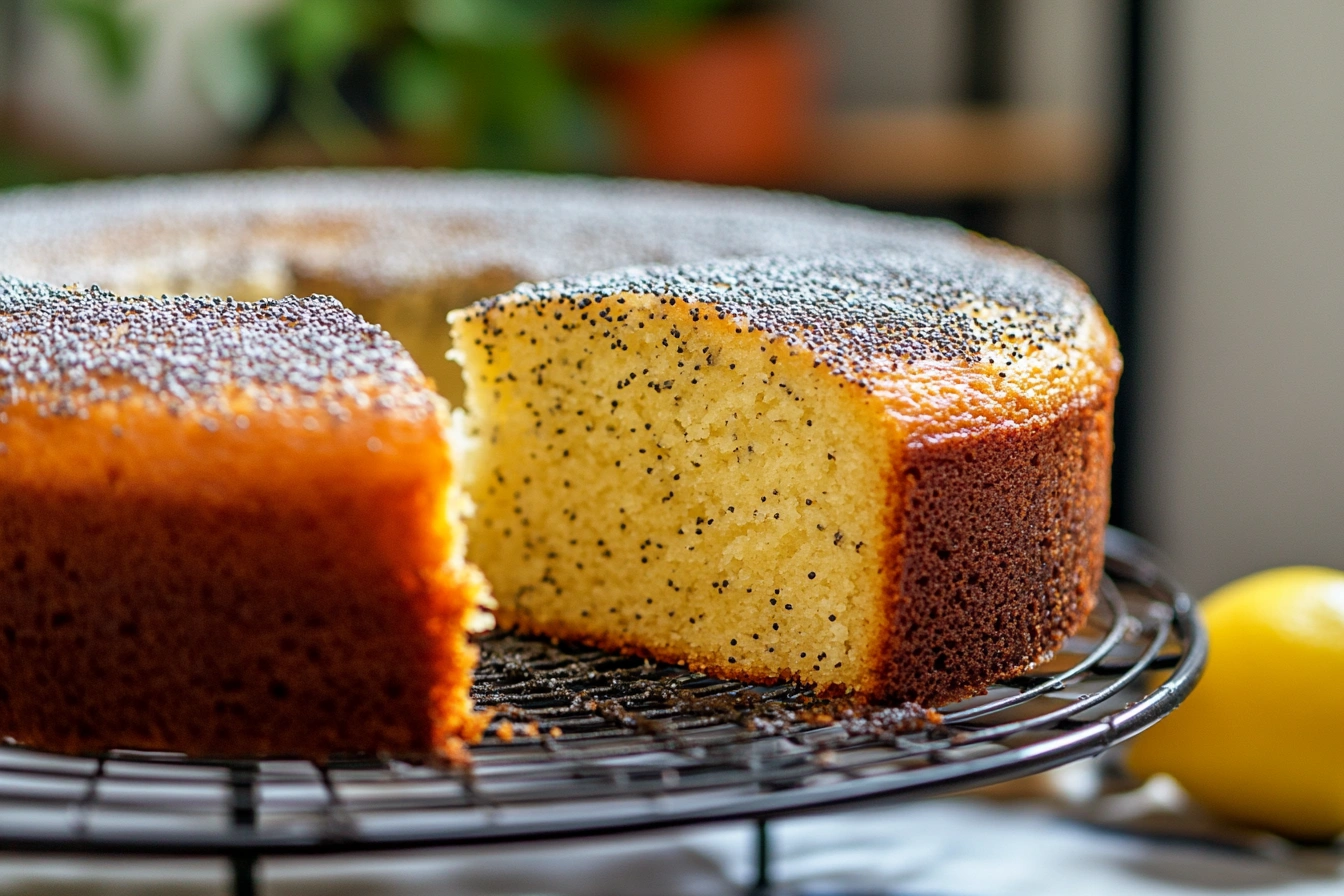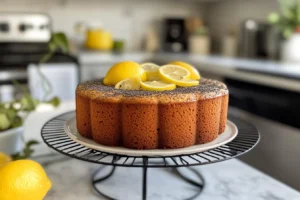Why soak poppy seeds before baking? This article explores the crucial step of soaking poppy seeds, which is essential for unlocking their flavor and improving the texture in baked goods.
Why You Must Soak Poppy Seeds Before Baking 5 Key Reasons
Baking with poppy seeds adds a unique flavor and texture to many recipes. However, using them directly can often lead to undesirable results. Therefore, soaking poppy seeds before baking is a crucial step. This process softens the seeds. It also releases their distinctive flavor.
This is crucial for recipes where a smooth consistency is desired, such as a perfect cherry chip cake
Why Soaking Matters
Dry poppy seeds are hard and can be difficult to digest. Furthermore, they don’t release their full flavor profile when used dry. Consequently, soaking them in a liquid helps them plump up. It also softens their outer shell. In addition, this process makes them easier to incorporate into your dough or batter. Specifically, this step transforms the seeds from a hard, dry ingredient into a more palatable one. Additionally, softened seeds distribute more evenly throughout the mixture.
The Science Behind Soaking
The process of soaking poppy seeds is also about maximizing their flavor. When the seeds absorb liquid, they release aromatic compounds. Hence, this increases the overall taste of your baked goods. Additionally, the soaking liquid itself becomes infused with the poppy seed flavor. Thus, it enhances the end product even more. Indeed, this is a key factor in why the soaking process is so beneficial for baking. Moreover, this process allows for a more nuanced and richer flavor. Furthermore, these aromatic compounds are often locked inside dry seeds. Therefore, soaking becomes the key to unlocking them.
How to Properly Soak Poppy Seeds
Soaking poppy seeds is a straightforward process. However, it is vital to follow certain steps to get the best results. Specifically, the type of liquid and the soaking time both play a role in the final outcome. Accordingly, understanding these parameters ensures optimal results when baking.
Choosing the Right Liquid
You can soak poppy seeds in a variety of liquids. For example, milk, water, or even lemon juice can be used. The liquid used will influence the final flavor. Moreover, milk adds a creamy note. Water offers a neutral base. Lemon juice, however, enhances the seed’s subtle flavors. Therefore, select the liquid that best compliments your recipe. Likewise, using a liquid that harmonious with other components elevates the overall taste. Chiefly, choosing the appropriate liquid is a basic and essential aspect of baking with soaked poppy seeds.
The Ideal Soaking Time
The ideal soaking time for poppy seeds is typically between 2 to 4 hours. However, some recipes may call for overnight soaking. Basically, longer soaking times result in softer poppy seeds. Therefore, it’s essential to follow the specific instructions in your recipe. Subsequently, carefully adhere to the recipe’s soaking instructions for the best outcome. Additionally, soaking times may vary depending on the type and freshness of your seeds. Eventually, experimenting with various soaking durations might lead to better techniques.
Preparing for Baking
After soaking, the poppy seeds should have swollen considerably. Subsequently, drain them well before incorporating them into your batter or dough. Ultimately, using soaked poppy seeds will contribute to better texture and flavor. Moreover, draining the seeds thoroughly prevents excess moisture in your batter. Consequently, this step helps maintain the desired consistency of your baked goods. Further, proper draining ensures that the seeds don’t weigh down the batter. Therefore, this assists in producing a light and airy product.
The Benefits of Using Soaked Poppy Seeds
Using soaked poppy seeds is not only about improving the texture. Indeed, it also has significant benefits for the flavor and overall baking experience. Furthermore, it enhances your baking creations. Specifically, by soaking your poppy seeds, you are essentially ensuring an elevated outcome in flavor and texture. Likewise, the effects of soaking go beyond just the seeds themselves, it also impacts the overall quality of your baked goods.
Enhanced Flavor Profile
Soaking poppy seeds helps release their unique characteristic nutty flavor. Chiefly, this process adds depth to your baked goods. Accordingly, recipes with soaked poppy seeds have a richer taste than those with dry ones. This flavor is subtle yet undoubtedly present, enriching the final product. Also, the soaking process allows the poppy seeds to express their full aromatic potential. Moreover, the subtle nutty undertones are noticeably intensified, which results in a more satisfying taste. Thus, the enhanced flavor profile is a clear benefit of soaking.
Improved Texture
Soaking makes poppy seeds soft and pliable. Therefore, they are more pleasant to eat. In addition, this prevents them from being gritty in your finished product. Comparatively, dry poppy seeds often remain hard. They can feel unpleasant in the mouth. Furthermore, this results in a smoother, more enjoyable mouthfeel. Eventually, the softer texture of soaked seeds contributes to a better overall eating experience. Hence, this is one of the main reasons for soaking. Indeed, this difference in texture is a very important reason.
Better Integration
Soaked poppy seeds blend more easily into doughs and batters. Specifically, they don’t draw moisture out. Dry seeds, however, can make the batter drier. Eventually, this will lead to inconsistent textures. Moreover, using soaked seeds helps maintain the desired consistency of your recipes. Also, by ensuring even distribution of the seeds, soaking helps maintain the integrity of your batter. Thus, the even blending of softened seeds prevents pockets of dry poppy seeds from being in the baked goods. Accordingly, this results in a final product with a consistent texture and look.
Recipes That Benefit from Soaked Poppy Seeds
Many baked goods gain from the use of soaked poppy seeds. For example, cakes, muffins, and bread. Thus, understanding how to incorporate them correctly is important. Consequently, you get the most out of their flavor and texture. Ultimately, knowing when and how to include soaked poppy seeds can drastically improve your baked creations. Likewise, these seeds offer a wonderful way to enhance classic baked recipes. Hence, from simple to sophisticated recipes, soaked poppy seeds are a perfect addition.
Poppy Seed Cakes
Poppy seed cakes are a classic choice for soaked poppy seeds. These seeds provide a unique texture to this dessert. Equally, the soaking process ensures that they are soft and easily integrated into the cake batter. This enhances the overall flavor and moistness. Moreover, the soft and swollen seeds contribute to a better texture. Additionally, soaked poppy seeds are an essential part of the traditional recipe. Specifically, they make the cake much more flavorful and enjoyable. Indeed, the result is a tender and moist cake.
Muffins with Poppy Seeds
Muffins benefit greatly from the addition of soaked poppy seeds. Specifically, the seeds add a delightful crunch while maintaining softness. Furthermore, their nutty flavor compliments the other flavors in the muffin, providing a great flavor combination. Also, they create a lovely subtle texture contrast. Consequently, the use of soaked poppy seeds takes the muffins to another level. Accordingly, the result is a perfect balance of texture and taste. Thus, the improved taste and texture highlight the importance of soaking.
Poppy Seed Bread
Poppy seed bread is another way to showcase the usefulness of soaked poppy seeds. Likewise, the seeds add texture and flavor to the bread. Accordingly, the soaking step is essential to achieve the ideal softness and taste. Ultimately, you will create a satisfying experience. Also, the softened seeds create a pleasant, chewy interior. Hence, this improves the overall bread texture. Furthermore, the rich flavor of soaked poppy seeds is noticeable in each bite. Specifically, the use of soaked seeds transforms ordinary bread into a culinary treat.
Common Mistakes to Avoid When Soaking Poppy Seeds
While soaking poppy seeds is not difficult, avoiding common mistakes is necessary. Specifically, knowing what not to do will help guarantee the best results. Moreover, it enhances the baking experience. Likewise, understanding these errors enables bakers to avoid potential issues. Indeed, it’s often the small details that make the biggest impact in baking.
Using Too Much Liquid
Using too much soaking liquid can make the poppy seeds too mushy. Therefore, use just enough to cover the seeds. Additionally, don’t over soak the seeds as this can affect their overall texture. Hence, you must strike the right balance. Accordingly, it is essential to ensure that the seeds are just covered. Furthermore, over-saturation can lead to a mushy and unpleasant consistency. Thus, measuring the liquid carefully is essential for success.
Soaking for Too Long
Soaking poppy seeds for too long can also cause them to lose their texture. Thus, following recipe instructions is necessary. It’s best to soak them for the recommended time. Conversely, soaking them for too short a time may not yield the desired softness. Specifically, long soaking times could result in a mushy texture. Furthermore, it’s important to adhere to the times outlined in your recipe. Also, under-soaking will prevent the seeds from properly absorbing the liquid. Eventually, finding the balance is crucial for optimal texture.
Forgetting to Drain Properly
Consequently, failure to drain poppy seeds after soaking can add excess liquid to your batter. Thus, this can affect the consistency of your recipe. Explicitly, drain the seeds before incorporating them. Furthermore, proper draining prevents excess water in the baked goods. Likewise, neglecting this step can affect the rise and final texture. Therefore, this step is extremely important and shouldn’t be skipped. Indeed, it plays a key role in maintaining the quality of your recipe.
Poppy Seeds and Digestion
Beyond the flavor and texture benefits, soaking poppy seeds can improve digestion. Specifically, the process of soaking helps break down some of their components. Therefore, making them easier for the body to process. Moreover, this leads to a more pleasant post-meal experience. Accordingly, this makes the seeds easier on the digestive system.
Breaking Down Components
Dry poppy seeds have a hard outer shell. However, soaking helps soften this shell. Additionally, this also assists the body in absorbing nutrients better. Accordingly, this reduces the risk of digestive discomfort. Furthermore, softer shells are also easier for the body to process and break down. Ultimately, this increases nutrient absorption, Additionally, this benefit can be especially useful for those with sensitive systems. Specifically, this can make the seeds more tolerable.
Potential Digestive Benefits
Some people experience mild bloating with dry poppy seeds. Soaking can reduce this issue. Further, it makes the seeds gentler on the digestive system. Specifically, soaking allows better processing by the body. Likewise, this improves the overall experience. Additionally, these benefits are particularly relevant for those with digestive sensitivities. Chiefly, this helps prevent digestive discomfort and improve overall tolerability. Therefore, soaking can make them easier to enjoy without negative side effects.
Conclusion
It unlocks their full flavor potential, enhances texture, and improves digestibility.
Following simple steps choosing the right liquid, soaking for the correct time, and draining properly can truly transform your baked creations.
Whether you’re making a simple loaf of bread or an elaborate cake, soaking poppy seeds is an essential part of the culinary process.
The difference in both flavor and texture will be noticeable, making your baked goods more enjoyable and satisfying.
By understanding and appreciating the value of this step, you can elevate your baking and reap all the benefits soaked poppy seeds have to offer
Frequently Asked Questions
Why do you need to soak poppy seeds for baking?
Soaking poppy seeds before baking is important. Firstly, it softens the seeds, making them more digestible. Secondly, it helps release their flavor, enhancing your baked goods. Thirdly, it also prevents them from being crunchy, resulting in a better texture.
What happens if you don’t soak poppy seeds before baking?
If you don’t soak poppy seeds, they will remain hard. Furthermore, they won’t release their full flavor. Also, they may not integrate well into your batter or dough, resulting in a less appealing texture. Thus, soaking is essential for the best result.
What liquids can you use to soak poppy seeds?
You can soak poppy seeds in various liquids. Specifically, these include milk, water, or lemon juice. Indeed, each liquid will give a slightly different flavor. Ultimately, choose the liquid based on your recipe and personal preference.
How long do you need to soak poppy seeds?
Generally, poppy seeds should be soaked for 2 to 4 hours. However, some recipes may call for an overnight soak. Accordingly, adjust soaking time based on recipe instructions. Ultimately, longer soaking results in softer seeds.
Whether you’re creating a stunning cake or experimenting with naturally sourdough bagels, taking this small amount of extra time can make a big difference in your final product.



